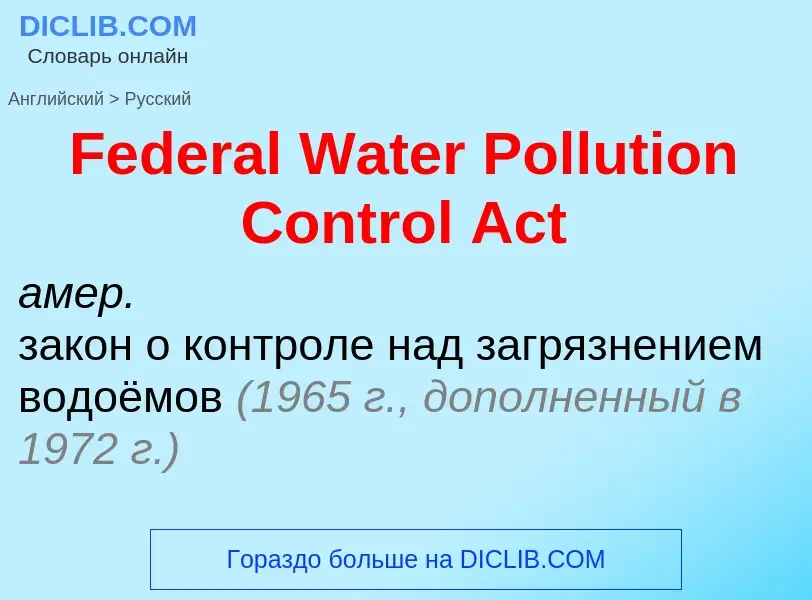Tradução e análise de palavras por inteligência artificial ChatGPT
Nesta página você pode obter uma análise detalhada de uma palavra ou frase, produzida usando a melhor tecnologia de inteligência artificial até o momento:
- como a palavra é usada
- frequência de uso
- é usado com mais frequência na fala oral ou escrita
- opções de tradução de palavras
- exemplos de uso (várias frases com tradução)
- etimologia
Federal Water Pollution Control Act - tradução para russo
закон о контроле над загрязнением водоёмов (1965 г., дополненный в 1972 г.)
закон о качестве воды (1965 г.)
Definição
Wikipédia
The Clean Water Act (CWA) is the primary federal law in the United States governing water pollution. Its objective is to restore and maintain the chemical, physical, and biological integrity of the nation's waters; recognizing the responsibilities of the states in addressing pollution and providing assistance to states to do so, including funding for publicly owned treatment works for the improvement of wastewater treatment; and maintaining the integrity of wetlands.
The Clean Water Act was one of the United States' first and most influential modern environmental laws. Its laws and regulations are primarily administered by the U.S. Environmental Protection Agency (EPA) in coordination with state governments, though some of its provisions, such as those involving filling or dredging, are administered by the U.S. Army Corps of Engineers. Its implementing regulations are codified at 40 C.F.R. Subchapters D, N, and O (Parts 100–140, 401–471, and 501–503).
Technically, the name of the law is the Federal Water Pollution Control Act. The first FWPCA was enacted in 1948, but took on its modern form when completely rewritten in 1972 in an act entitled the Federal Water Pollution Control Act Amendments of 1972. Major changes have subsequently been introduced via amendatory legislation including the Clean Water Act of 1977 and the Water Quality Act (WQA) of 1987.
The Clean Water Act does not directly address groundwater contamination. Groundwater protection provisions are included in the Safe Drinking Water Act, Resource Conservation and Recovery Act, and the Superfund act.





![The construction grants program funded new sewage treatment plants and upgrading existing plants to national [[secondary treatment]] standards. The construction grants program funded new sewage treatment plants and upgrading existing plants to national [[secondary treatment]] standards.](https://commons.wikimedia.org/wiki/Special:FilePath/US Wastewater Treatment Levels Before & After CWA.png?width=200)
